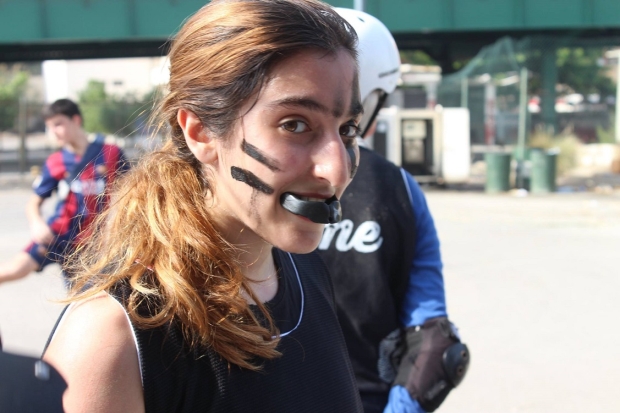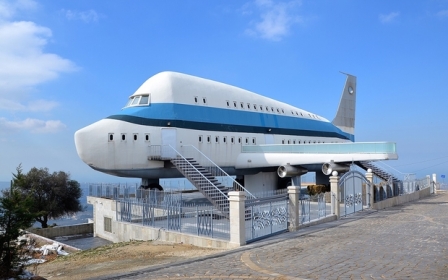Skates on: Beirut's first all-women derby team are rolling

BEIRUT - Nada Ben Jemaa sits on the stairs of a basketball court in Gemmayzeh, eastern Beirut, as she puts protective pads on her knees and roller skates on her feet.
She adjusts the helmet above her curly hair, standing up in almost perfect equilibrium on her six wheels and joins the small group of women gathered at the centre of the court. Toting fierce stares as they stand together on their skates, they begin their weekly Sunday practice exuding confidence and perseverance.
Beirut's first all-women roller derby team is preparing to compete with the CaiRollers in December. Roller derby is a full-contact sport which involves two teams who skate counter-clockwise around an oval track.
New MEE newsletter: Jerusalem Dispatch
Sign up to get the latest insights and analysis on Israel-Palestine, alongside Turkey Unpacked and other MEE newsletters
Most players are undergraduate students at the American University of Beirut through a competitive scholarship run by the US-Middle East Partnership Initiative (MEPI), open to academically talented youngsters across the region. However, they are planning to add more diversity and welcome people outside of the university bubble.
A blessing and a curse
The Tunisian team leader explains that the group only has two Lebanese members - although not from Beirut. In the past year they have tried hard to grow roller derby’s audience in Lebanon and encourage girls to come to practise and join them.
“We mostly attract curious passersby with children, who see us in this weird outfit and like to cheer for us. A few times new girls have showed up for practice, but never stay long enough to take over the club’s future legacy,” Ben Jemaa says.
The international mix is both a blessing and a curse: diversity of backgrounds is what makes this group unique, but their study visa has an expiration date that cannot be ignored.
“We don’t know if it’s going to last, and it’s sad because this sport has taught us so much about community and endurance and we want other people to feel the same and carry it on,” Ben Jemaa says.
Collaboration is key
The students took over the team management by themselves, splitting tasks because GAME Lebanon, a Beirut-based NGO providing street sports programmes for troubled youth in the city, helps in providing equipment but not coaching or a venue for practice.
Everyone contributes with their skills: Wiem Ben Rim, the computer genius of the group, built their website; Nahla Hassan Mansour, an Egyptian teammate and communications major, acts as their PR person; Ben Jemaa, who studies business, took on the leadership role.
'I love the sense of community and sisterhood that we built through this sport, it got us closer'
- Alaa al-Mutawa, Roller Derby Beirut
Karima al-Gelany, a 21-year-old Egyptian player in the Beirut team, has undergone extensive training with the more mature CaiRollers so she has taken the coaching role.
“I love the sense of community and sisterhood that we built through this sport, it got us closer, made us support each other, made us communicate with each other,” says Alaa al-Mutawa, a Bahraini player.
Cairo ahead
As summer begins, the team has more time to practice and focus on its next more tangible goal: have a transnational bout and head to Cairo in December.
“Hopefully soon our dream of facing CaiRollers will come true, and I think our team is ready for it,”says al-Gelany, but being an Egyptian national has not made her loyalties waiver to her team in Beirut.
It might be Roller Derby Beirut’s last chance to play together with all the core members since its inception. Yet it is also a more effective way to advertise the team as an internationally competitive group, promote its image in Lebanon, and hopefully recruit new members.
The only thing the team needs to travel to Egypt are the funds as there are no official requirements, only a mutual agreement that the teams want to compete with each other.
'As roller derby is a sport where you can fall and hurt yourself a lot or even break bones, it’s necessary to have a good health coverage plan'
- Nada Ben Jemaa, team leader
Ben Jemaa explains that as soon as the autumn semester begins, they will start an online crowdfunding campaign that will hopefully be successful.
The team has a lot of support across the world - more than it has in Lebanon - as a result of the participation of foreign skaters visiting Beirut.
Cancelled bookings
Most Arab roller derby teams run their clubs as NGOs, but have a hard time finding sponsors, as “no one is willing to put their money on a sport not taken seriously enough yet”, Ben Jemaa says.
"We self-funded our venue booking by paying $20 a month each. And finding venues for practice is also a challenge, as here in Lebanon the sport itself is not respected enough.”
Until the team can get official sponsorship, they will continue to use their own money and ask for donations.
'No one is willing to put their money on a sport not taken seriously enough'
- Nada Ben Jemaa, team leader
Ben Jemaa recalls seeing the playing court booking cancelled minutes before practice or taken over by other sports clubs considered more important, despite having paid the fees. Another major issue, she explains, is the weak Lebanese health insurance system.
“As roller derby is a sport where you can fall and hurt yourself a lot or even break bones, it’s necessary to have a good health coverage plan. Our scholarship covers those costs, but for Lebanese it’s been a major obstacle to join us,” says “Killer Pillar", Ben Jemaa’s nickname on the field.
From Texas to Beirut
Modern flat track roller derby erupted from a small upstart in Texas, US to a competitive, international sport, and the Women’s Flat Track Derby Association has had to quickly adapt to meet the demands of a community rapidly expanding beyond North America.
“It can be daunting for non-English speaking leagues to translate training, rules, and gameplay information," explains Katherine Rugg, a representative from WFTDA.
"Depending on the country, it can also be difficult - and very expensive - to obtain skates and protective gear, to find coaches and well-matched opponents nearby, or to fund-raise the travel costs to compete with teams in other continents,” she added.
The Beirut team is not the first and only roller derby club in the MENA region: there are leagues in Dubai and Abu Dhabi, mainly made up of foreign expats, and the most famous CaiRollers, born during the 2011 Egyptian upheavals.
But while the other national teams reached stability through the years, the relatively new Beirut chapter is already at risk of disappearing: “Soon, most of us will graduate and we need new members to take over,” says Wiem Ben Rim, another Tunisian player.
The beginnings
The club was founded in 2014 by Danish veteran skater Elisabeth Wolffhechel while she was doing an internship at GAME Lebanon.
'It’s been hard to impose ourselves just as athletes instead of political objects'
- Nada Ben Jemaa, team leader
Wolffhechel's started a Facebook page and began recruiting members, including Ben Jemaa, who was among the first to join her.
Ben Jemaa convinced some of her fellow friends to form the first official team in Lebanon.
In late 2015, Wolffhechel left the country, so the students took over the team management.
Athletes, not political objects
Despite not being the first all-women sport club in Lebanon’s capital – with others from football to rugby – lately the fearless players have drawn international attention for other, less sport-related, reasons.
The Lebanese team made headlines for breaking stereotypes as Arab women athletes in a brutal sport. On one hand, this has increased their support, but on the other it has raised concerns among team members.
From the stage of the Roller Derby World Summit in Manchester, UK, this past April, Ben Jemaa, together with representatives from UN Women and ESPN, addressed these concerns as a keynote speaker of this annual conference.
Nike’s viral advertisement portraying a hijabi athlete grew the image of “badass” Arab women doing sports to defy oppressive patriarchal societies. So when a couple of hijabs popped out under the helmets of Beirut's derby players - with their cheeks painted with war-like stripes, their wheels rolling against the asphalt, and personal stories of families left behind in war-torn Yemen - they instantly became internet-famous.
'They turned us into a rebellious group. Maybe we are, but we want people to focus on the sport, the team, the sisterhood that we created'
-Wiem Ben Rim, Roller Derby Beirut
“It’s been hard to impose ourselves just as athletes instead of political objects. For some reason, when presenting our team, people imagine us sneaking out of our university dorms’ windows at night to do something forbidden. But it’s not anything like that. We’re not breaking the norms to revolt against society,” Ben Jemaa explains.
“They turned us into a rebellious group. Maybe we are, but we want people to focus on the sport, the team, the sisterhood that we created and the way we push our bodies to the limits,” says Ben Rim. “We want to inspire more women to join us,” she continues.
Roller Derby Beirut’s experience shows how Arab women, even those wearing hijabs, are free to play sports in the daylight if moved by true passion, even those considered not appropriate for them.
That has been easier to do in a more open Arab society like the Lebanese one, but each team member is hoping to bring roller derby to their homes upon graduation; even the more conservative ones like Bahrain, or Yemen, once the war ends.
These challenges, however, have never stopped the Beirut team from aiming high.
“We hope to see Roller Derby Beirut, something we currently run and recently moulded all by ourselves, compete in the World Cup one day, like the best teams in the world,” Ben Jemaa concludes.
Middle East Eye delivers independent and unrivalled coverage and analysis of the Middle East, North Africa and beyond. To learn more about republishing this content and the associated fees, please fill out this form. More about MEE can be found here.







